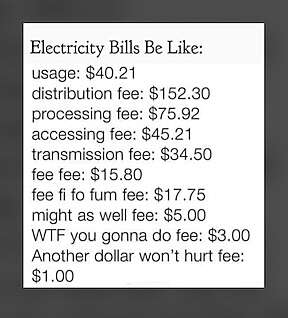George Angwin, 17 February 2022
Why is this funny?
In 1957, the teacher of my English Composition course brought up the question of what constitutes comedy. After some discussion, this was the University of Chicago, he offered his opinion. Comedy is the contradiction of expectations set up be the situation. The example I remember is the clown who comes on stage clothed as the popular image of a financier including top hat, but his clothes are disheveled and ill-fitting, and he wobbles about as though he can barely stand up. The clothing sets up certain expectations, but the details and his actions contradict them. We laugh.
There is more to the electricity bill though. It belongs to the kind of comedy produced by people who are feeling helpless. One might call it "protest comedy". The electricity bill is funny in a rueful way because it is too close to a reality we are helpless to avoid or correct. Yes, the list of fees is excessive, but if you compare your current electricity bill to one from 50 years ago, you will notice a disturbing trend. And not only in electricity, but in all essential services. This reminds me of another piece of humor by a refugee from the Soviet Union who told me in 1983: "We pretend to work, and they pretend to pay us." Protest comedy.
By the way, that English teacher was Philip Roth. His day job was an instructor at the University while he was writing his first book, Goodbye, Columbus: personal stories reminiscent of Robert Graves’s Goodbye to All That.
George
Crescat scientia, vita excolatur.
Crescat scientia, vita excolatur.
